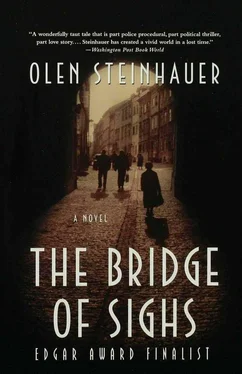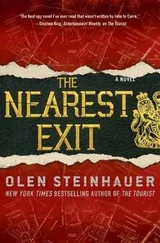Olen Steinhauer - The Bridge of Sights
Здесь есть возможность читать онлайн «Olen Steinhauer - The Bridge of Sights» весь текст электронной книги совершенно бесплатно (целиком полную версию без сокращений). В некоторых случаях можно слушать аудио, скачать через торрент в формате fb2 и присутствует краткое содержание. Жанр: Политический детектив, на английском языке. Описание произведения, (предисловие) а так же отзывы посетителей доступны на портале библиотеки ЛибКат.
- Название:The Bridge of Sights
- Автор:
- Жанр:
- Год:неизвестен
- ISBN:нет данных
- Рейтинг книги:3 / 5. Голосов: 1
-
Избранное:Добавить в избранное
- Отзывы:
-
Ваша оценка:
- 60
- 1
- 2
- 3
- 4
- 5
The Bridge of Sights: краткое содержание, описание и аннотация
Предлагаем к чтению аннотацию, описание, краткое содержание или предисловие (зависит от того, что написал сам автор книги «The Bridge of Sights»). Если вы не нашли необходимую информацию о книге — напишите в комментариях, мы постараемся отыскать её.
The Bridge of Sights — читать онлайн бесплатно полную книгу (весь текст) целиком
Ниже представлен текст книги, разбитый по страницам. Система сохранения места последней прочитанной страницы, позволяет с удобством читать онлайн бесплатно книгу «The Bridge of Sights», без необходимости каждый раз заново искать на чём Вы остановились. Поставьте закладку, и сможете в любой момент перейти на страницу, на которой закончили чтение.
Интервал:
Закладка:
The typewriter was, Roberto assured him, a steal at only four koronas, and he included The Spark as a gift. But when Emil returned with his new possessions, he was deep in the silence again. They could not know it had been broken already, so they persevered, keeping their eyes to their desks as he set the typewriter down. He tested the chair with a hand, then settled down and experimented with a few keys. The silence had been broken, whether or not they liked it, and with time it would necessarily dissipate.
Again, that hereditary hope.
He got up and gazed over the big typist’s head at the bulletin board. Poorly printed faces of convicts and escapees, letters from appreciative citizens, and memos with stamps that proved they were words sent down from levels as high as the Central Committee. The memos outlined new laws controlling how the inspectors should go about their jobs: which buildings they could enter without authorization and which they could not; the limits of interrogation methodologies; when a case had to be handed over to state security for reassignment.
The typewriter stopped, and the big inspector-whose name, Emil knew from the files, was Ferenc-glanced at the chief, who had just arrived and hurried directly to his office without a word to anyone. Then he looked briefly at Emil before returning to his typing.
Pinned to the corkboard, criminal faces were labeled with names and numbers and lists of murders and dates committed. Some were doubly guilty; frauds or conspiracies were piled upon their homicides. A few faces were obscured by a blue stamp: deceased.
Emil smiled at Ferenc. The man’s hard, cold stare looked nothing like melancholia.
At three, Leonek Terzian called to Ferenc and the fat one (Stefan, Emil recalled): “It’s time.”
All three grabbed their hats and jackets and headed for the door, Stefan walking with a barely noticeable limp. The security inspector didn’t look up.
Emil followed after a moment, but cautiously, Terzian’s small fist still crisp in his mind, and from the top of the steps watched them climb into a black Mercedes. The engine made knocking sounds as they drove away.
The security inspector looked at him when he wandered back in, but by the time Emil nodded, the inspector’s face had returned to his papers. He was too busy safeguarding the socialist state to acknowledge anyone. There were volumes stored in his locked files, and Emil felt an overwhelming curiosity. A peek, or just a hint. But not even he was stupid enough to break the concentration of a member of state security.
Emil’s desk, tidy and unused, The Spark folded loosely beside the smart typewriter, was thoroughly uninviting. He touched the stack of paper with the tips of his fingers.
This, truly, had gone far enough.
He took five firm steps to the chief’s door and pounded with the side of his hand. The milky glass rattled.
“Enter.”
The office was a mess, papers scattered like seed over the wooden floor, stacks slipping from file cabinets and out of boxes piled in the corner. It stank of stale smoke, and the beige curtains behind the chief were untied so only a single white blade of sunlight made it through. Above, a yellow bulb burned.
“Christ” Chief Moska tossed a pen on the desk, splattering black ink, and settled back into his creaking chair. “What is it?”
Emil shut the door and centered himself. He wanted to do this right. “Chief Moska. I need to work.”
“You have your own desk, Brod.”
He held himself steady. “I have no cases. If you give me a case, then I can do my job.”
“Your job?”
“Exactly,” said Emil. “My job, which is to investigate homicides reported to this office.”
The chief leaned forward between his spread elbows, and his chiseled face stretched a moment. His shirt was stained at the pits; it was terribly hot in the office. “Your job, Comrade Brod, is to do what I say. That’s why? have these walls and that door.” He nodded at the door as if the movement would push Emil through it. “You follow?”
“Yes, Comrade.” “Chief.”‘
“Yes. Chief.”
Moska’s chair moaned as he shifted and set his two open hands on the desk. He turned the hands over, palms up, then looked slowly around the room. “I wouldn’t want to waste your particular talents, Brod, which are no doubt considerable.” Something caught his eye, and he leveled a long finger at three boxes of files stuffed in a corner beside a dismantled radiator. “Some jackass put those files in chronological order. Can you believe it?”
“I’m trying to, Chief.”
He peered at Emil, and in the yellow, dusty light his expression was murderous. “I want them in alphabetical order, Brod. You’re familiar with the alphabet?”
“Intimately.”
“Get to it.”
The boxes were unwieldy and heavy, but his stupefied anger sustained him. He lined them beside his desk, ignoring the security inspector’s beady gaze, then sat on the floor. From the first box he removed all files in which the family name began with A. Althann, Abajian, Adamow, Annopol. The same with the second box, and the third. He made a pile. Then B. It went on. A sharp ache rooted into his back, but he did not change position. He wanted to give no sign of pain. Street voices came in waves, arguments and the crack of an automobile hitting a wooden cart. The ache grew into his shoulders, and by the time he reached M, it covered his entire back. Outside, the squeal of a pig being butchered. Maslow, Miroslav, Mas. Unstable towers of folders rose all around him.
It was after five-thirty when the chief emerged from his office, stretching into a gray blazer. He nodded at the security inspector, then stood over Emil a moment.
“Don t work so hard, Brod. You want to make this last. Consider it your own five-year plan.”
Emil squinted up at him; the light from the windows made a hard silhouette. When he spoke, his throat was dry: “Is this what everyone does?”
“Everyone?” The chief’s smile was just visible on his backlit face. He shrugged instead of answering, and walked out.
The security inspector, hands on the file in his lap, turned to him and frowned. His flat face expressed nothing.
“There’s something you want to say?” called Emil, all good sense gone. “Have some thoughts you want to share?”
The security inspector stared a moment more, raised his eyebrows as though about to shrug, and closed the folder in his lap. He stuck it under his arm, grabbed his hat and umbrella, and followed the chief out of the station.
CHAPTER FOUR
The war was winding down when he took the train, alone, from Ruscova, through the Capital, and farther north. Through sallow, crumbling cities: Warsaw, Vilnius, Riga, Tallinn. The ferry brought him across the Gulf of Finland. Soviet Russia had only recently stopped bombing, but Helsinki, compared to those others, was still a city in form and structure, waterborn and regal. It took his breath away.
He didn’t know the language, so like all foreigners he found his way to the little bars scattered throughout the islands like tiny, intoxicated nations. He found his own nation in the Carp, a dark, fetid place where they posted news of work and warnings to newcomers. A drunk countryman stumbled off his stool and told Emil about the fishing expedition into the Arctic. This is real money, he had said, nodding into his vodka. You come hack a rich man.
That hadn’t been quite true, but after four months of splitting open those heavy, gray creatures with his curved knife and washing their scarlet guts from the deck alongside bitter Slavs and Mediterraneans and lost Arabs, using German as their shared language, he returned to the Capital with enough money to take an apartment in the crowded Sixth District, where the proles emerged from their low, rented rooms and squeezed into trams headed for factories and shops in town.
Читать дальшеИнтервал:
Закладка:
Похожие книги на «The Bridge of Sights»
Представляем Вашему вниманию похожие книги на «The Bridge of Sights» списком для выбора. Мы отобрали схожую по названию и смыслу литературу в надежде предоставить читателям больше вариантов отыскать новые, интересные, ещё непрочитанные произведения.
Обсуждение, отзывы о книге «The Bridge of Sights» и просто собственные мнения читателей. Оставьте ваши комментарии, напишите, что Вы думаете о произведении, его смысле или главных героях. Укажите что конкретно понравилось, а что нет, и почему Вы так считаете.












